Organisational Behaviour Analysis: Hays Travel Limited Report
VerifiedAdded on 2023/01/09
|15
|5047
|41
Report
AI Summary
This report provides an in-depth analysis of organisational behaviour within Hays Travel Limited, a travel and tourism company. The report examines the influence of organisational culture, politics, and power on individual and team performance, utilising Handy's Model and Chanlat's Characteristics. It further explores motivation theories, including content (Maslow's hierarchy) and process (expectancy) theories, to understand how to achieve organisational goals. The report also differentiates between effective and ineffective teams and discusses the application of organisational behaviour philosophies in a business context. It covers topics such as organisational culture, power dynamics, and political behaviour, providing insights into how these factors impact employee performance and overall organisational success. The analysis includes the application of various motivational theories and explores the characteristics of effective and ineffective teams within the company context. The report aims to provide a comprehensive understanding of organisational behaviour principles and their practical application within a real-world business setting.
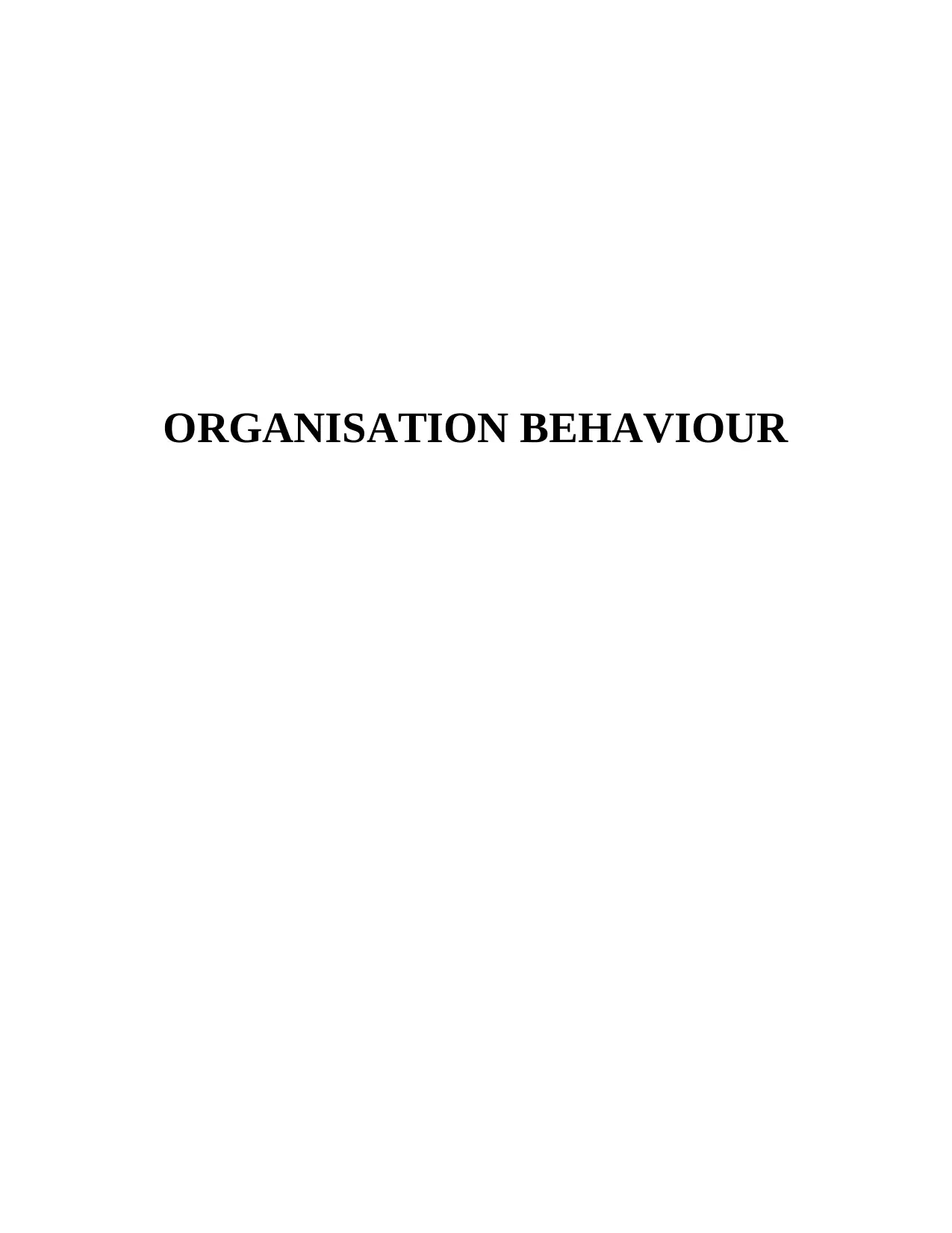
ORGANISATION BEHAVIOUR
Paraphrase This Document
Need a fresh take? Get an instant paraphrase of this document with our AI Paraphraser
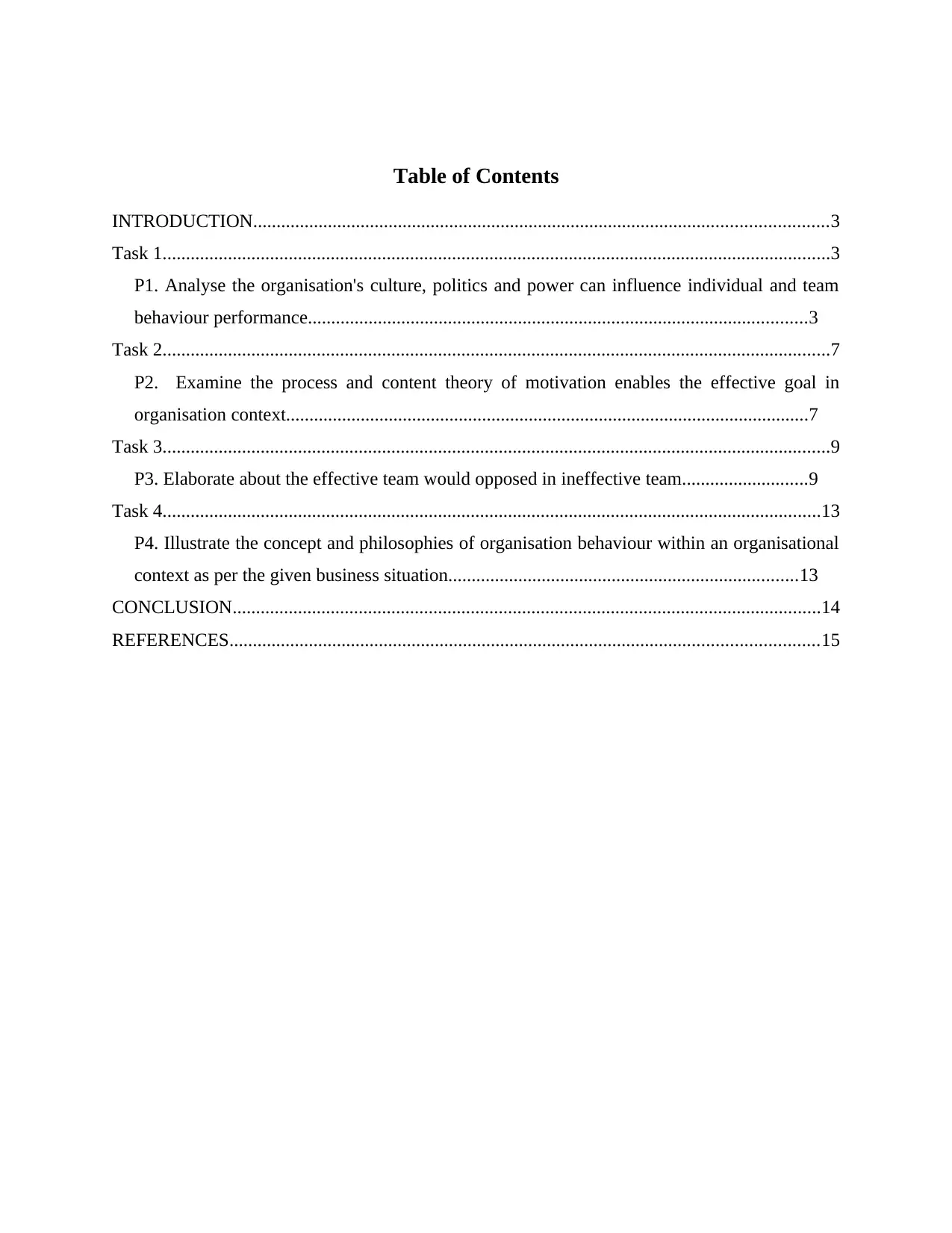
Table of Contents
INTRODUCTION...........................................................................................................................3
Task 1...............................................................................................................................................3
P1. Analyse the organisation's culture, politics and power can influence individual and team
behaviour performance...........................................................................................................3
Task 2...............................................................................................................................................7
P2. Examine the process and content theory of motivation enables the effective goal in
organisation context................................................................................................................7
Task 3...............................................................................................................................................9
P3. Elaborate about the effective team would opposed in ineffective team...........................9
Task 4.............................................................................................................................................13
P4. Illustrate the concept and philosophies of organisation behaviour within an organisational
context as per the given business situation...........................................................................13
CONCLUSION..............................................................................................................................14
REFERENCES..............................................................................................................................15
INTRODUCTION...........................................................................................................................3
Task 1...............................................................................................................................................3
P1. Analyse the organisation's culture, politics and power can influence individual and team
behaviour performance...........................................................................................................3
Task 2...............................................................................................................................................7
P2. Examine the process and content theory of motivation enables the effective goal in
organisation context................................................................................................................7
Task 3...............................................................................................................................................9
P3. Elaborate about the effective team would opposed in ineffective team...........................9
Task 4.............................................................................................................................................13
P4. Illustrate the concept and philosophies of organisation behaviour within an organisational
context as per the given business situation...........................................................................13
CONCLUSION..............................................................................................................................14
REFERENCES..............................................................................................................................15
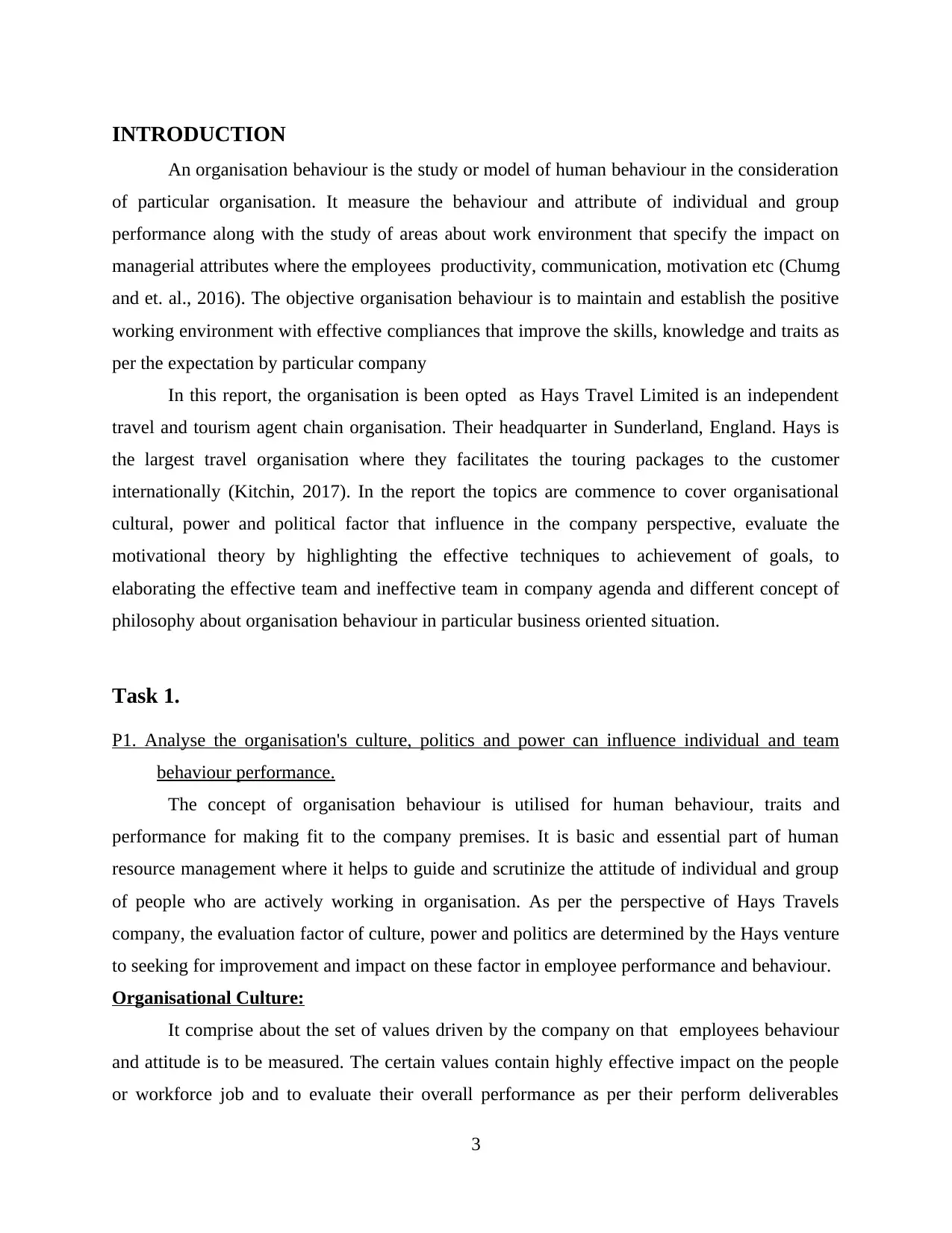
INTRODUCTION
An organisation behaviour is the study or model of human behaviour in the consideration
of particular organisation. It measure the behaviour and attribute of individual and group
performance along with the study of areas about work environment that specify the impact on
managerial attributes where the employees productivity, communication, motivation etc (Chumg
and et. al., 2016). The objective organisation behaviour is to maintain and establish the positive
working environment with effective compliances that improve the skills, knowledge and traits as
per the expectation by particular company
In this report, the organisation is been opted as Hays Travel Limited is an independent
travel and tourism agent chain organisation. Their headquarter in Sunderland, England. Hays is
the largest travel organisation where they facilitates the touring packages to the customer
internationally (Kitchin, 2017). In the report the topics are commence to cover organisational
cultural, power and political factor that influence in the company perspective, evaluate the
motivational theory by highlighting the effective techniques to achievement of goals, to
elaborating the effective team and ineffective team in company agenda and different concept of
philosophy about organisation behaviour in particular business oriented situation.
Task 1.
P1. Analyse the organisation's culture, politics and power can influence individual and team
behaviour performance.
The concept of organisation behaviour is utilised for human behaviour, traits and
performance for making fit to the company premises. It is basic and essential part of human
resource management where it helps to guide and scrutinize the attitude of individual and group
of people who are actively working in organisation. As per the perspective of Hays Travels
company, the evaluation factor of culture, power and politics are determined by the Hays venture
to seeking for improvement and impact on these factor in employee performance and behaviour.
Organisational Culture:
It comprise about the set of values driven by the company on that employees behaviour
and attitude is to be measured. The certain values contain highly effective impact on the people
or workforce job and to evaluate their overall performance as per their perform deliverables
3
An organisation behaviour is the study or model of human behaviour in the consideration
of particular organisation. It measure the behaviour and attribute of individual and group
performance along with the study of areas about work environment that specify the impact on
managerial attributes where the employees productivity, communication, motivation etc (Chumg
and et. al., 2016). The objective organisation behaviour is to maintain and establish the positive
working environment with effective compliances that improve the skills, knowledge and traits as
per the expectation by particular company
In this report, the organisation is been opted as Hays Travel Limited is an independent
travel and tourism agent chain organisation. Their headquarter in Sunderland, England. Hays is
the largest travel organisation where they facilitates the touring packages to the customer
internationally (Kitchin, 2017). In the report the topics are commence to cover organisational
cultural, power and political factor that influence in the company perspective, evaluate the
motivational theory by highlighting the effective techniques to achievement of goals, to
elaborating the effective team and ineffective team in company agenda and different concept of
philosophy about organisation behaviour in particular business oriented situation.
Task 1.
P1. Analyse the organisation's culture, politics and power can influence individual and team
behaviour performance.
The concept of organisation behaviour is utilised for human behaviour, traits and
performance for making fit to the company premises. It is basic and essential part of human
resource management where it helps to guide and scrutinize the attitude of individual and group
of people who are actively working in organisation. As per the perspective of Hays Travels
company, the evaluation factor of culture, power and politics are determined by the Hays venture
to seeking for improvement and impact on these factor in employee performance and behaviour.
Organisational Culture:
It comprise about the set of values driven by the company on that employees behaviour
and attitude is to be measured. The certain values contain highly effective impact on the people
or workforce job and to evaluate their overall performance as per their perform deliverables
3
⊘ This is a preview!⊘
Do you want full access?
Subscribe today to unlock all pages.

Trusted by 1+ million students worldwide
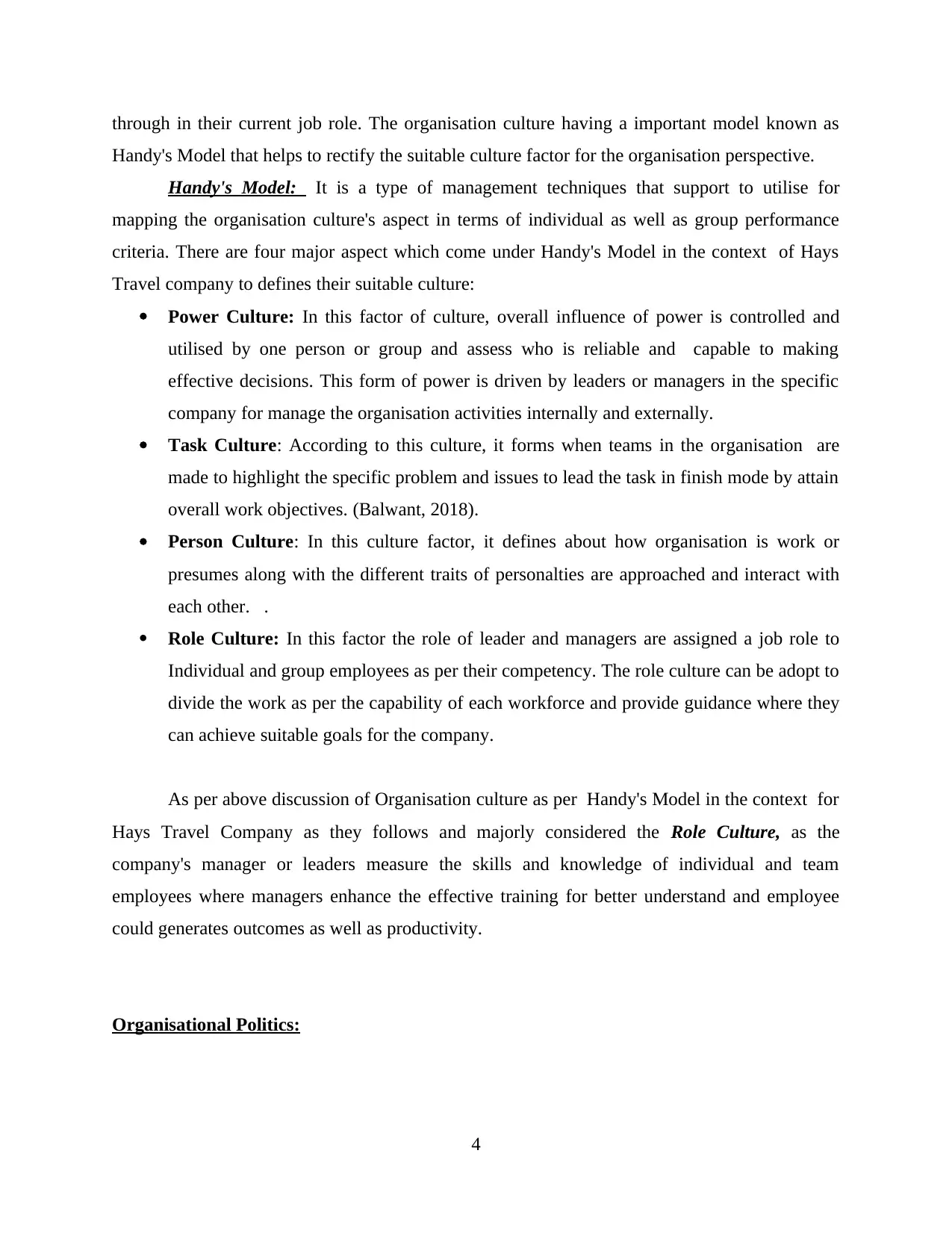
through in their current job role. The organisation culture having a important model known as
Handy's Model that helps to rectify the suitable culture factor for the organisation perspective.
Handy's Model: It is a type of management techniques that support to utilise for
mapping the organisation culture's aspect in terms of individual as well as group performance
criteria. There are four major aspect which come under Handy's Model in the context of Hays
Travel company to defines their suitable culture:
Power Culture: In this factor of culture, overall influence of power is controlled and
utilised by one person or group and assess who is reliable and capable to making
effective decisions. This form of power is driven by leaders or managers in the specific
company for manage the organisation activities internally and externally.
Task Culture: According to this culture, it forms when teams in the organisation are
made to highlight the specific problem and issues to lead the task in finish mode by attain
overall work objectives. (Balwant, 2018).
Person Culture: In this culture factor, it defines about how organisation is work or
presumes along with the different traits of personalties are approached and interact with
each other. .
Role Culture: In this factor the role of leader and managers are assigned a job role to
Individual and group employees as per their competency. The role culture can be adopt to
divide the work as per the capability of each workforce and provide guidance where they
can achieve suitable goals for the company.
As per above discussion of Organisation culture as per Handy's Model in the context for
Hays Travel Company as they follows and majorly considered the Role Culture, as the
company's manager or leaders measure the skills and knowledge of individual and team
employees where managers enhance the effective training for better understand and employee
could generates outcomes as well as productivity.
Organisational Politics:
4
Handy's Model that helps to rectify the suitable culture factor for the organisation perspective.
Handy's Model: It is a type of management techniques that support to utilise for
mapping the organisation culture's aspect in terms of individual as well as group performance
criteria. There are four major aspect which come under Handy's Model in the context of Hays
Travel company to defines their suitable culture:
Power Culture: In this factor of culture, overall influence of power is controlled and
utilised by one person or group and assess who is reliable and capable to making
effective decisions. This form of power is driven by leaders or managers in the specific
company for manage the organisation activities internally and externally.
Task Culture: According to this culture, it forms when teams in the organisation are
made to highlight the specific problem and issues to lead the task in finish mode by attain
overall work objectives. (Balwant, 2018).
Person Culture: In this culture factor, it defines about how organisation is work or
presumes along with the different traits of personalties are approached and interact with
each other. .
Role Culture: In this factor the role of leader and managers are assigned a job role to
Individual and group employees as per their competency. The role culture can be adopt to
divide the work as per the capability of each workforce and provide guidance where they
can achieve suitable goals for the company.
As per above discussion of Organisation culture as per Handy's Model in the context for
Hays Travel Company as they follows and majorly considered the Role Culture, as the
company's manager or leaders measure the skills and knowledge of individual and team
employees where managers enhance the effective training for better understand and employee
could generates outcomes as well as productivity.
Organisational Politics:
4
Paraphrase This Document
Need a fresh take? Get an instant paraphrase of this document with our AI Paraphraser
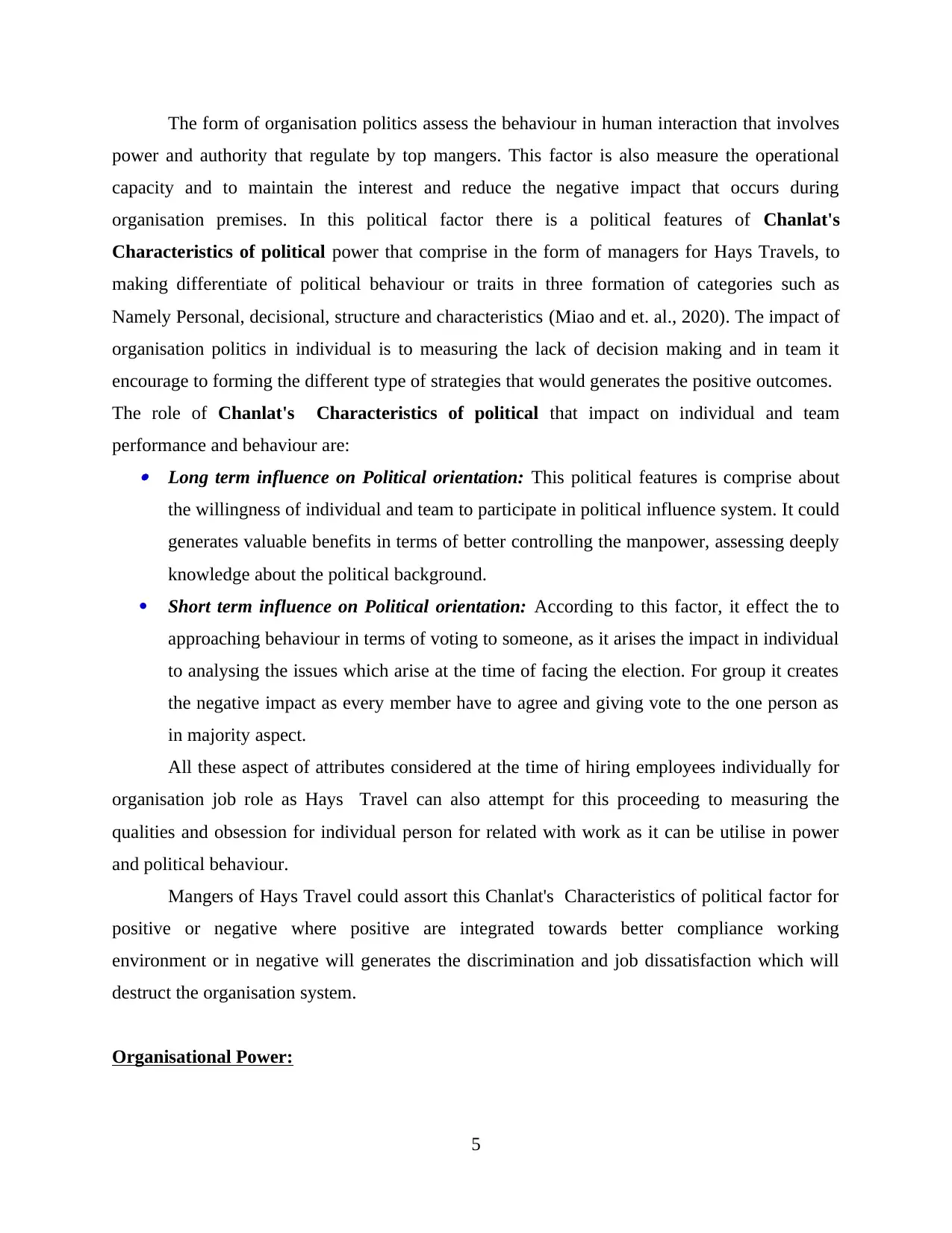
The form of organisation politics assess the behaviour in human interaction that involves
power and authority that regulate by top mangers. This factor is also measure the operational
capacity and to maintain the interest and reduce the negative impact that occurs during
organisation premises. In this political factor there is a political features of Chanlat's
Characteristics of political power that comprise in the form of managers for Hays Travels, to
making differentiate of political behaviour or traits in three formation of categories such as
Namely Personal, decisional, structure and characteristics (Miao and et. al., 2020). The impact of
organisation politics in individual is to measuring the lack of decision making and in team it
encourage to forming the different type of strategies that would generates the positive outcomes.
The role of Chanlat's Characteristics of political that impact on individual and team
performance and behaviour are: Long term influence on Political orientation: This political features is comprise about
the willingness of individual and team to participate in political influence system. It could
generates valuable benefits in terms of better controlling the manpower, assessing deeply
knowledge about the political background.
Short term influence on Political orientation: According to this factor, it effect the to
approaching behaviour in terms of voting to someone, as it arises the impact in individual
to analysing the issues which arise at the time of facing the election. For group it creates
the negative impact as every member have to agree and giving vote to the one person as
in majority aspect.
All these aspect of attributes considered at the time of hiring employees individually for
organisation job role as Hays Travel can also attempt for this proceeding to measuring the
qualities and obsession for individual person for related with work as it can be utilise in power
and political behaviour.
Mangers of Hays Travel could assort this Chanlat's Characteristics of political factor for
positive or negative where positive are integrated towards better compliance working
environment or in negative will generates the discrimination and job dissatisfaction which will
destruct the organisation system.
Organisational Power:
5
power and authority that regulate by top mangers. This factor is also measure the operational
capacity and to maintain the interest and reduce the negative impact that occurs during
organisation premises. In this political factor there is a political features of Chanlat's
Characteristics of political power that comprise in the form of managers for Hays Travels, to
making differentiate of political behaviour or traits in three formation of categories such as
Namely Personal, decisional, structure and characteristics (Miao and et. al., 2020). The impact of
organisation politics in individual is to measuring the lack of decision making and in team it
encourage to forming the different type of strategies that would generates the positive outcomes.
The role of Chanlat's Characteristics of political that impact on individual and team
performance and behaviour are: Long term influence on Political orientation: This political features is comprise about
the willingness of individual and team to participate in political influence system. It could
generates valuable benefits in terms of better controlling the manpower, assessing deeply
knowledge about the political background.
Short term influence on Political orientation: According to this factor, it effect the to
approaching behaviour in terms of voting to someone, as it arises the impact in individual
to analysing the issues which arise at the time of facing the election. For group it creates
the negative impact as every member have to agree and giving vote to the one person as
in majority aspect.
All these aspect of attributes considered at the time of hiring employees individually for
organisation job role as Hays Travel can also attempt for this proceeding to measuring the
qualities and obsession for individual person for related with work as it can be utilise in power
and political behaviour.
Mangers of Hays Travel could assort this Chanlat's Characteristics of political factor for
positive or negative where positive are integrated towards better compliance working
environment or in negative will generates the discrimination and job dissatisfaction which will
destruct the organisation system.
Organisational Power:
5
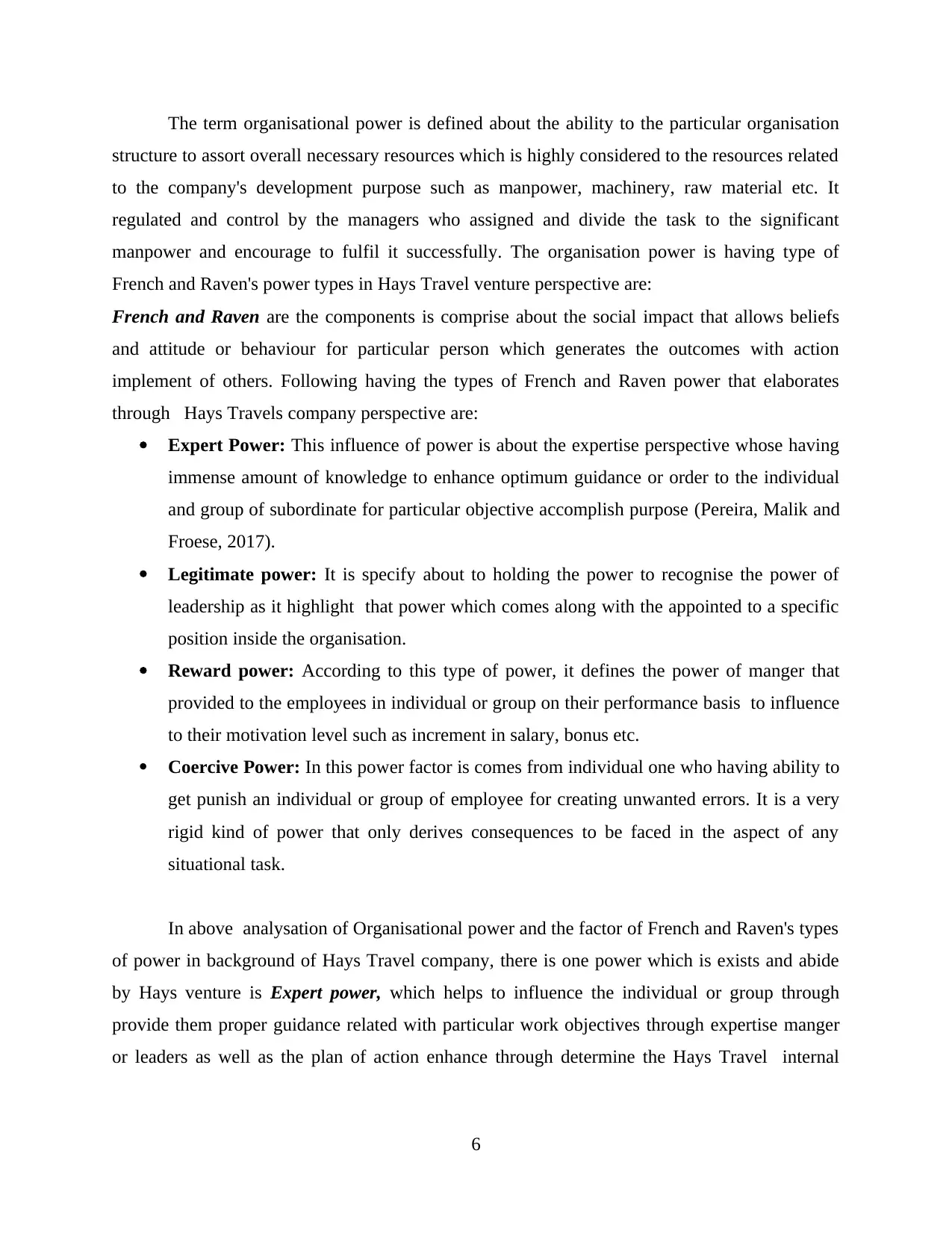
The term organisational power is defined about the ability to the particular organisation
structure to assort overall necessary resources which is highly considered to the resources related
to the company's development purpose such as manpower, machinery, raw material etc. It
regulated and control by the managers who assigned and divide the task to the significant
manpower and encourage to fulfil it successfully. The organisation power is having type of
French and Raven's power types in Hays Travel venture perspective are:
French and Raven are the components is comprise about the social impact that allows beliefs
and attitude or behaviour for particular person which generates the outcomes with action
implement of others. Following having the types of French and Raven power that elaborates
through Hays Travels company perspective are:
Expert Power: This influence of power is about the expertise perspective whose having
immense amount of knowledge to enhance optimum guidance or order to the individual
and group of subordinate for particular objective accomplish purpose (Pereira, Malik and
Froese, 2017).
Legitimate power: It is specify about to holding the power to recognise the power of
leadership as it highlight that power which comes along with the appointed to a specific
position inside the organisation.
Reward power: According to this type of power, it defines the power of manger that
provided to the employees in individual or group on their performance basis to influence
to their motivation level such as increment in salary, bonus etc.
Coercive Power: In this power factor is comes from individual one who having ability to
get punish an individual or group of employee for creating unwanted errors. It is a very
rigid kind of power that only derives consequences to be faced in the aspect of any
situational task.
In above analysation of Organisational power and the factor of French and Raven's types
of power in background of Hays Travel company, there is one power which is exists and abide
by Hays venture is Expert power, which helps to influence the individual or group through
provide them proper guidance related with particular work objectives through expertise manger
or leaders as well as the plan of action enhance through determine the Hays Travel internal
6
structure to assort overall necessary resources which is highly considered to the resources related
to the company's development purpose such as manpower, machinery, raw material etc. It
regulated and control by the managers who assigned and divide the task to the significant
manpower and encourage to fulfil it successfully. The organisation power is having type of
French and Raven's power types in Hays Travel venture perspective are:
French and Raven are the components is comprise about the social impact that allows beliefs
and attitude or behaviour for particular person which generates the outcomes with action
implement of others. Following having the types of French and Raven power that elaborates
through Hays Travels company perspective are:
Expert Power: This influence of power is about the expertise perspective whose having
immense amount of knowledge to enhance optimum guidance or order to the individual
and group of subordinate for particular objective accomplish purpose (Pereira, Malik and
Froese, 2017).
Legitimate power: It is specify about to holding the power to recognise the power of
leadership as it highlight that power which comes along with the appointed to a specific
position inside the organisation.
Reward power: According to this type of power, it defines the power of manger that
provided to the employees in individual or group on their performance basis to influence
to their motivation level such as increment in salary, bonus etc.
Coercive Power: In this power factor is comes from individual one who having ability to
get punish an individual or group of employee for creating unwanted errors. It is a very
rigid kind of power that only derives consequences to be faced in the aspect of any
situational task.
In above analysation of Organisational power and the factor of French and Raven's types
of power in background of Hays Travel company, there is one power which is exists and abide
by Hays venture is Expert power, which helps to influence the individual or group through
provide them proper guidance related with particular work objectives through expertise manger
or leaders as well as the plan of action enhance through determine the Hays Travel internal
6
⊘ This is a preview!⊘
Do you want full access?
Subscribe today to unlock all pages.

Trusted by 1+ million students worldwide
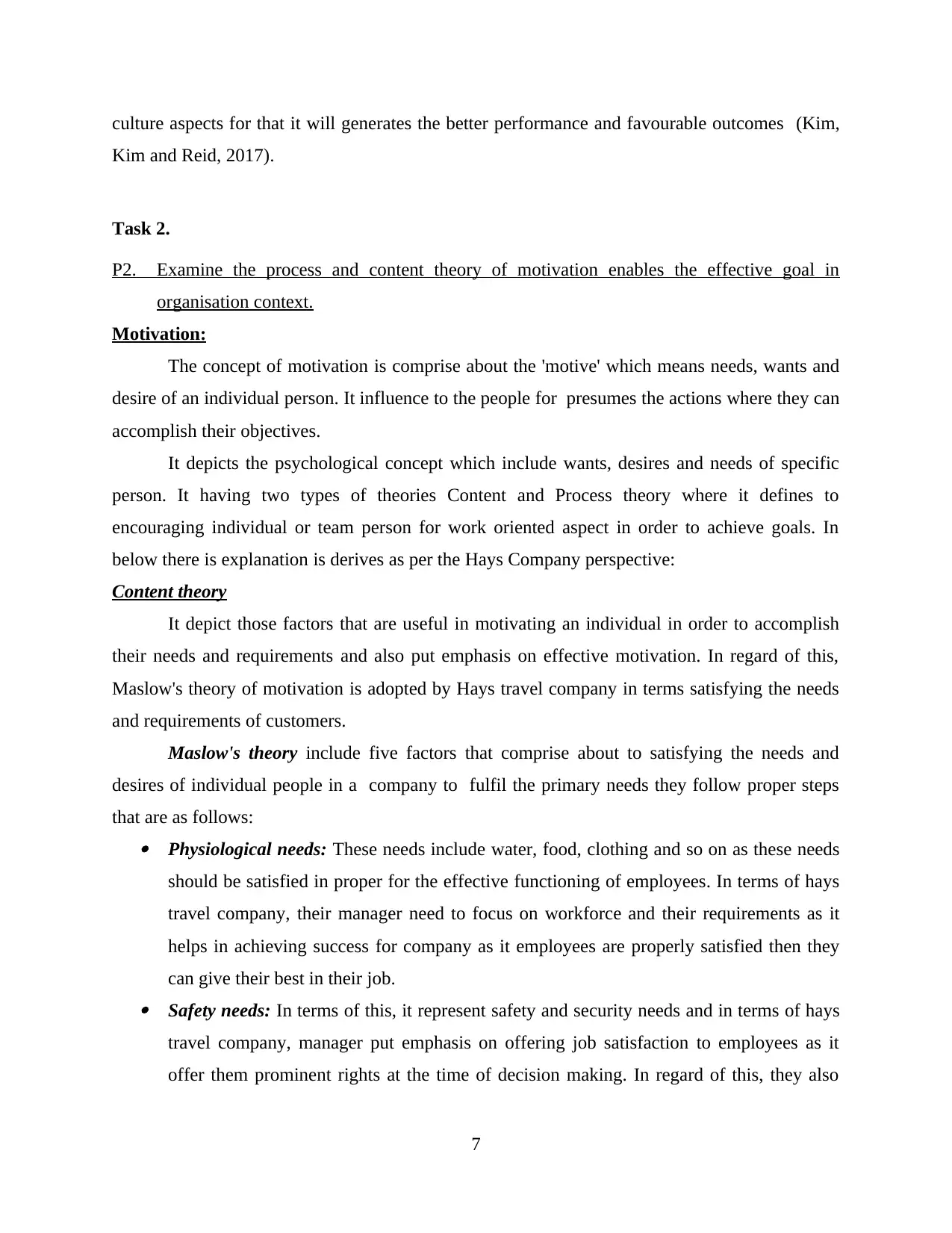
culture aspects for that it will generates the better performance and favourable outcomes (Kim,
Kim and Reid, 2017).
Task 2.
P2. Examine the process and content theory of motivation enables the effective goal in
organisation context.
Motivation:
The concept of motivation is comprise about the 'motive' which means needs, wants and
desire of an individual person. It influence to the people for presumes the actions where they can
accomplish their objectives.
It depicts the psychological concept which include wants, desires and needs of specific
person. It having two types of theories Content and Process theory where it defines to
encouraging individual or team person for work oriented aspect in order to achieve goals. In
below there is explanation is derives as per the Hays Company perspective:
Content theory
It depict those factors that are useful in motivating an individual in order to accomplish
their needs and requirements and also put emphasis on effective motivation. In regard of this,
Maslow's theory of motivation is adopted by Hays travel company in terms satisfying the needs
and requirements of customers.
Maslow's theory include five factors that comprise about to satisfying the needs and
desires of individual people in a company to fulfil the primary needs they follow proper steps
that are as follows: Physiological needs: These needs include water, food, clothing and so on as these needs
should be satisfied in proper for the effective functioning of employees. In terms of hays
travel company, their manager need to focus on workforce and their requirements as it
helps in achieving success for company as it employees are properly satisfied then they
can give their best in their job. Safety needs: In terms of this, it represent safety and security needs and in terms of hays
travel company, manager put emphasis on offering job satisfaction to employees as it
offer them prominent rights at the time of decision making. In regard of this, they also
7
Kim and Reid, 2017).
Task 2.
P2. Examine the process and content theory of motivation enables the effective goal in
organisation context.
Motivation:
The concept of motivation is comprise about the 'motive' which means needs, wants and
desire of an individual person. It influence to the people for presumes the actions where they can
accomplish their objectives.
It depicts the psychological concept which include wants, desires and needs of specific
person. It having two types of theories Content and Process theory where it defines to
encouraging individual or team person for work oriented aspect in order to achieve goals. In
below there is explanation is derives as per the Hays Company perspective:
Content theory
It depict those factors that are useful in motivating an individual in order to accomplish
their needs and requirements and also put emphasis on effective motivation. In regard of this,
Maslow's theory of motivation is adopted by Hays travel company in terms satisfying the needs
and requirements of customers.
Maslow's theory include five factors that comprise about to satisfying the needs and
desires of individual people in a company to fulfil the primary needs they follow proper steps
that are as follows: Physiological needs: These needs include water, food, clothing and so on as these needs
should be satisfied in proper for the effective functioning of employees. In terms of hays
travel company, their manager need to focus on workforce and their requirements as it
helps in achieving success for company as it employees are properly satisfied then they
can give their best in their job. Safety needs: In terms of this, it represent safety and security needs and in terms of hays
travel company, manager put emphasis on offering job satisfaction to employees as it
offer them prominent rights at the time of decision making. In regard of this, they also
7
Paraphrase This Document
Need a fresh take? Get an instant paraphrase of this document with our AI Paraphraser
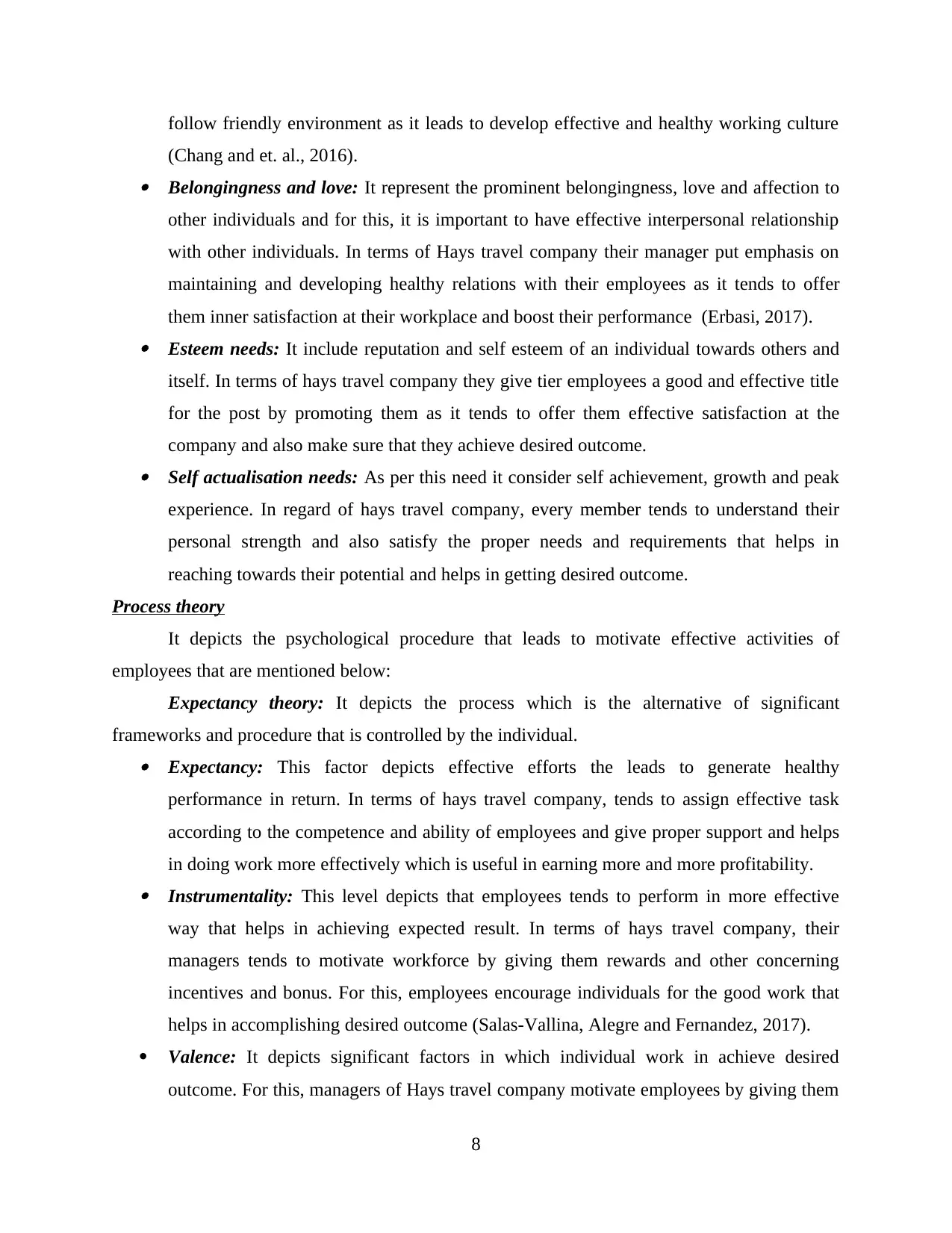
follow friendly environment as it leads to develop effective and healthy working culture
(Chang and et. al., 2016). Belongingness and love: It represent the prominent belongingness, love and affection to
other individuals and for this, it is important to have effective interpersonal relationship
with other individuals. In terms of Hays travel company their manager put emphasis on
maintaining and developing healthy relations with their employees as it tends to offer
them inner satisfaction at their workplace and boost their performance (Erbasi, 2017). Esteem needs: It include reputation and self esteem of an individual towards others and
itself. In terms of hays travel company they give tier employees a good and effective title
for the post by promoting them as it tends to offer them effective satisfaction at the
company and also make sure that they achieve desired outcome. Self actualisation needs: As per this need it consider self achievement, growth and peak
experience. In regard of hays travel company, every member tends to understand their
personal strength and also satisfy the proper needs and requirements that helps in
reaching towards their potential and helps in getting desired outcome.
Process theory
It depicts the psychological procedure that leads to motivate effective activities of
employees that are mentioned below:
Expectancy theory: It depicts the process which is the alternative of significant
frameworks and procedure that is controlled by the individual. Expectancy: This factor depicts effective efforts the leads to generate healthy
performance in return. In terms of hays travel company, tends to assign effective task
according to the competence and ability of employees and give proper support and helps
in doing work more effectively which is useful in earning more and more profitability. Instrumentality: This level depicts that employees tends to perform in more effective
way that helps in achieving expected result. In terms of hays travel company, their
managers tends to motivate workforce by giving them rewards and other concerning
incentives and bonus. For this, employees encourage individuals for the good work that
helps in accomplishing desired outcome (Salas-Vallina, Alegre and Fernandez, 2017).
Valence: It depicts significant factors in which individual work in achieve desired
outcome. For this, managers of Hays travel company motivate employees by giving them
8
(Chang and et. al., 2016). Belongingness and love: It represent the prominent belongingness, love and affection to
other individuals and for this, it is important to have effective interpersonal relationship
with other individuals. In terms of Hays travel company their manager put emphasis on
maintaining and developing healthy relations with their employees as it tends to offer
them inner satisfaction at their workplace and boost their performance (Erbasi, 2017). Esteem needs: It include reputation and self esteem of an individual towards others and
itself. In terms of hays travel company they give tier employees a good and effective title
for the post by promoting them as it tends to offer them effective satisfaction at the
company and also make sure that they achieve desired outcome. Self actualisation needs: As per this need it consider self achievement, growth and peak
experience. In regard of hays travel company, every member tends to understand their
personal strength and also satisfy the proper needs and requirements that helps in
reaching towards their potential and helps in getting desired outcome.
Process theory
It depicts the psychological procedure that leads to motivate effective activities of
employees that are mentioned below:
Expectancy theory: It depicts the process which is the alternative of significant
frameworks and procedure that is controlled by the individual. Expectancy: This factor depicts effective efforts the leads to generate healthy
performance in return. In terms of hays travel company, tends to assign effective task
according to the competence and ability of employees and give proper support and helps
in doing work more effectively which is useful in earning more and more profitability. Instrumentality: This level depicts that employees tends to perform in more effective
way that helps in achieving expected result. In terms of hays travel company, their
managers tends to motivate workforce by giving them rewards and other concerning
incentives and bonus. For this, employees encourage individuals for the good work that
helps in accomplishing desired outcome (Salas-Vallina, Alegre and Fernandez, 2017).
Valence: It depicts significant factors in which individual work in achieve desired
outcome. For this, managers of Hays travel company motivate employees by giving them
8
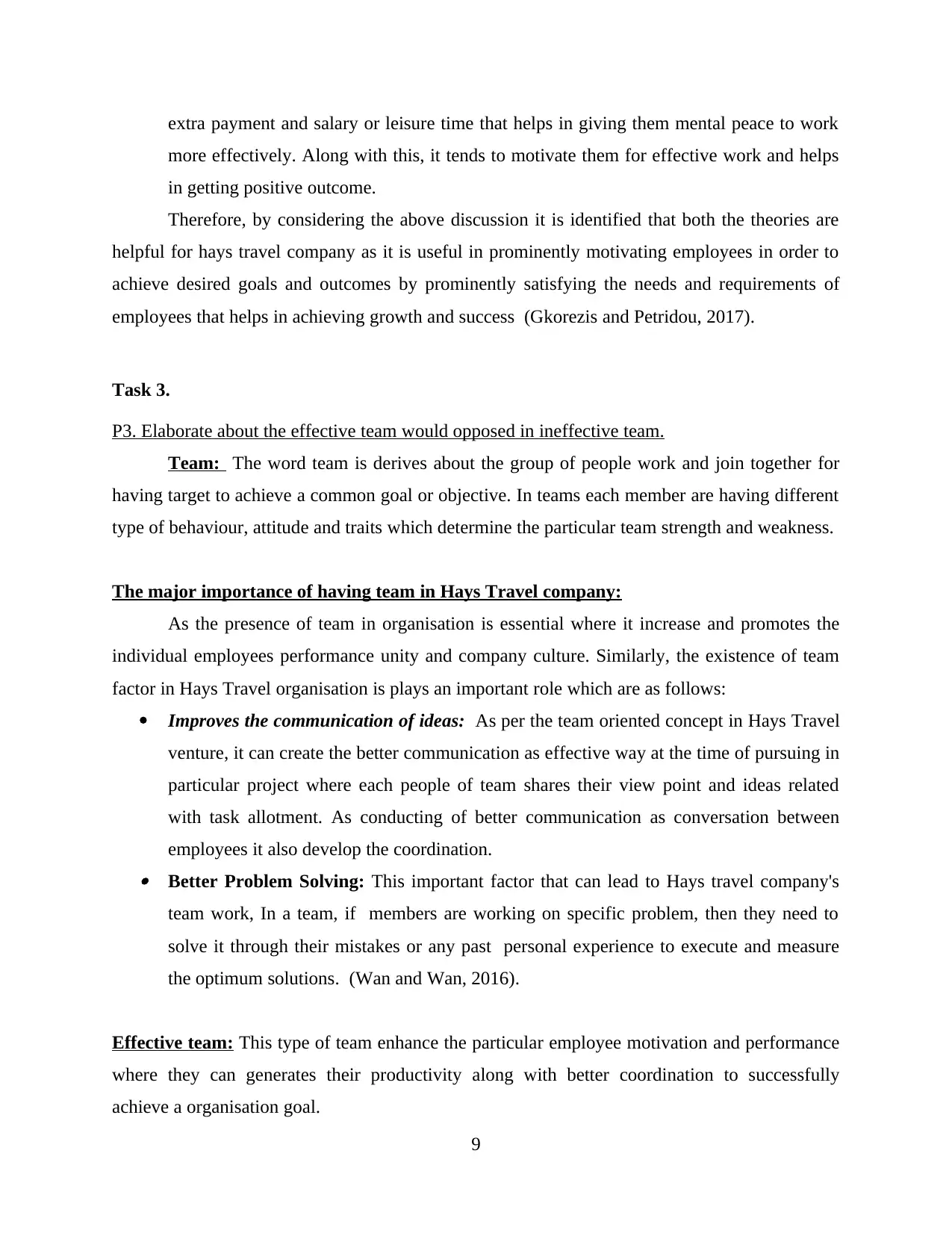
extra payment and salary or leisure time that helps in giving them mental peace to work
more effectively. Along with this, it tends to motivate them for effective work and helps
in getting positive outcome.
Therefore, by considering the above discussion it is identified that both the theories are
helpful for hays travel company as it is useful in prominently motivating employees in order to
achieve desired goals and outcomes by prominently satisfying the needs and requirements of
employees that helps in achieving growth and success (Gkorezis and Petridou, 2017).
Task 3.
P3. Elaborate about the effective team would opposed in ineffective team.
Team: The word team is derives about the group of people work and join together for
having target to achieve a common goal or objective. In teams each member are having different
type of behaviour, attitude and traits which determine the particular team strength and weakness.
The major importance of having team in Hays Travel company:
As the presence of team in organisation is essential where it increase and promotes the
individual employees performance unity and company culture. Similarly, the existence of team
factor in Hays Travel organisation is plays an important role which are as follows:
Improves the communication of ideas: As per the team oriented concept in Hays Travel
venture, it can create the better communication as effective way at the time of pursuing in
particular project where each people of team shares their view point and ideas related
with task allotment. As conducting of better communication as conversation between
employees it also develop the coordination. Better Problem Solving: This important factor that can lead to Hays travel company's
team work, In a team, if members are working on specific problem, then they need to
solve it through their mistakes or any past personal experience to execute and measure
the optimum solutions. (Wan and Wan, 2016).
Effective team: This type of team enhance the particular employee motivation and performance
where they can generates their productivity along with better coordination to successfully
achieve a organisation goal.
9
more effectively. Along with this, it tends to motivate them for effective work and helps
in getting positive outcome.
Therefore, by considering the above discussion it is identified that both the theories are
helpful for hays travel company as it is useful in prominently motivating employees in order to
achieve desired goals and outcomes by prominently satisfying the needs and requirements of
employees that helps in achieving growth and success (Gkorezis and Petridou, 2017).
Task 3.
P3. Elaborate about the effective team would opposed in ineffective team.
Team: The word team is derives about the group of people work and join together for
having target to achieve a common goal or objective. In teams each member are having different
type of behaviour, attitude and traits which determine the particular team strength and weakness.
The major importance of having team in Hays Travel company:
As the presence of team in organisation is essential where it increase and promotes the
individual employees performance unity and company culture. Similarly, the existence of team
factor in Hays Travel organisation is plays an important role which are as follows:
Improves the communication of ideas: As per the team oriented concept in Hays Travel
venture, it can create the better communication as effective way at the time of pursuing in
particular project where each people of team shares their view point and ideas related
with task allotment. As conducting of better communication as conversation between
employees it also develop the coordination. Better Problem Solving: This important factor that can lead to Hays travel company's
team work, In a team, if members are working on specific problem, then they need to
solve it through their mistakes or any past personal experience to execute and measure
the optimum solutions. (Wan and Wan, 2016).
Effective team: This type of team enhance the particular employee motivation and performance
where they can generates their productivity along with better coordination to successfully
achieve a organisation goal.
9
⊘ This is a preview!⊘
Do you want full access?
Subscribe today to unlock all pages.

Trusted by 1+ million students worldwide
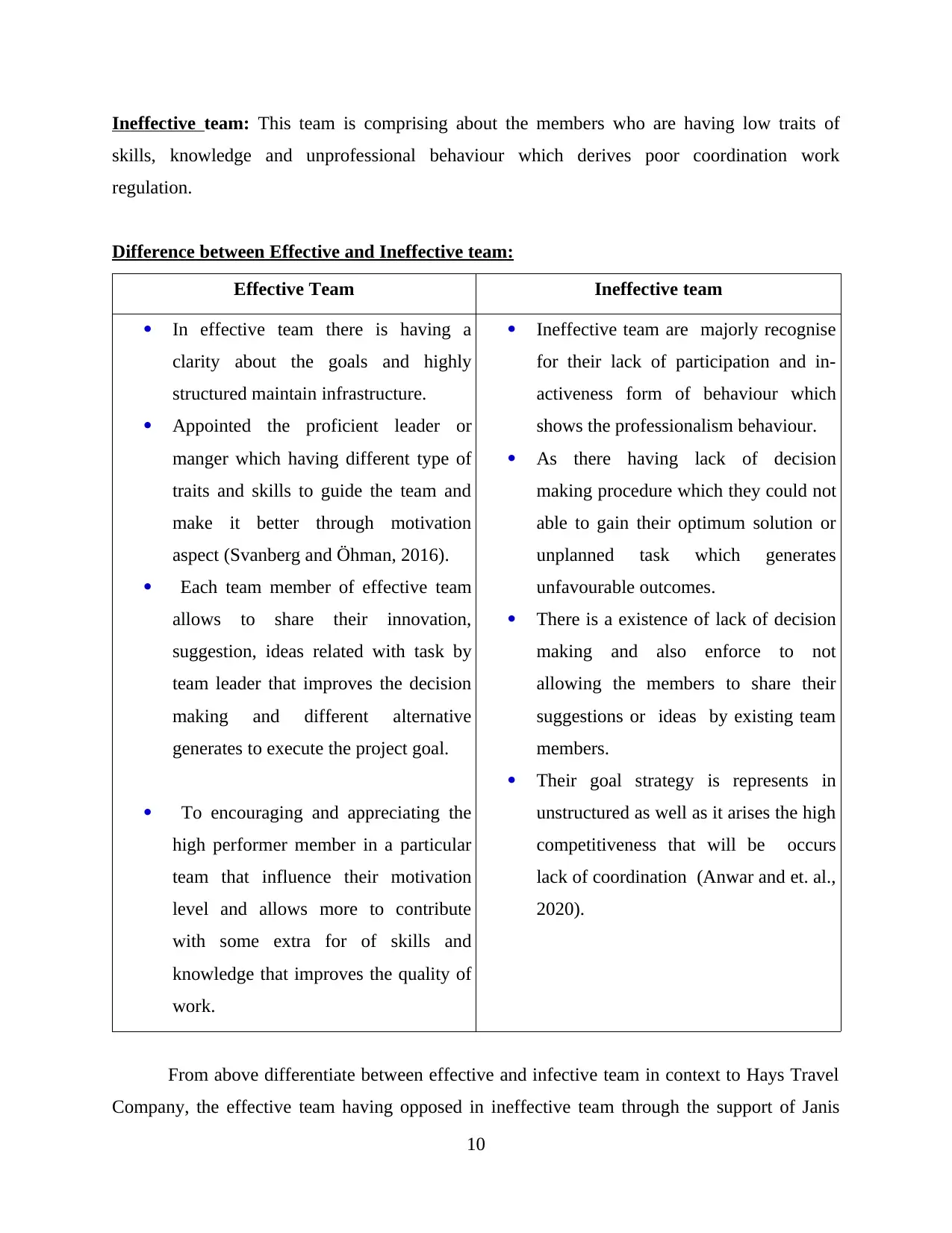
Ineffective team: This team is comprising about the members who are having low traits of
skills, knowledge and unprofessional behaviour which derives poor coordination work
regulation.
Difference between Effective and Ineffective team:
Effective Team Ineffective team
In effective team there is having a
clarity about the goals and highly
structured maintain infrastructure.
Appointed the proficient leader or
manger which having different type of
traits and skills to guide the team and
make it better through motivation
aspect (Svanberg and Öhman, 2016).
Each team member of effective team
allows to share their innovation,
suggestion, ideas related with task by
team leader that improves the decision
making and different alternative
generates to execute the project goal.
To encouraging and appreciating the
high performer member in a particular
team that influence their motivation
level and allows more to contribute
with some extra for of skills and
knowledge that improves the quality of
work.
Ineffective team are majorly recognise
for their lack of participation and in-
activeness form of behaviour which
shows the professionalism behaviour.
As there having lack of decision
making procedure which they could not
able to gain their optimum solution or
unplanned task which generates
unfavourable outcomes.
There is a existence of lack of decision
making and also enforce to not
allowing the members to share their
suggestions or ideas by existing team
members.
Their goal strategy is represents in
unstructured as well as it arises the high
competitiveness that will be occurs
lack of coordination (Anwar and et. al.,
2020).
From above differentiate between effective and infective team in context to Hays Travel
Company, the effective team having opposed in ineffective team through the support of Janis
10
skills, knowledge and unprofessional behaviour which derives poor coordination work
regulation.
Difference between Effective and Ineffective team:
Effective Team Ineffective team
In effective team there is having a
clarity about the goals and highly
structured maintain infrastructure.
Appointed the proficient leader or
manger which having different type of
traits and skills to guide the team and
make it better through motivation
aspect (Svanberg and Öhman, 2016).
Each team member of effective team
allows to share their innovation,
suggestion, ideas related with task by
team leader that improves the decision
making and different alternative
generates to execute the project goal.
To encouraging and appreciating the
high performer member in a particular
team that influence their motivation
level and allows more to contribute
with some extra for of skills and
knowledge that improves the quality of
work.
Ineffective team are majorly recognise
for their lack of participation and in-
activeness form of behaviour which
shows the professionalism behaviour.
As there having lack of decision
making procedure which they could not
able to gain their optimum solution or
unplanned task which generates
unfavourable outcomes.
There is a existence of lack of decision
making and also enforce to not
allowing the members to share their
suggestions or ideas by existing team
members.
Their goal strategy is represents in
unstructured as well as it arises the high
competitiveness that will be occurs
lack of coordination (Anwar and et. al.,
2020).
From above differentiate between effective and infective team in context to Hays Travel
Company, the effective team having opposed in ineffective team through the support of Janis
10
Paraphrase This Document
Need a fresh take? Get an instant paraphrase of this document with our AI Paraphraser
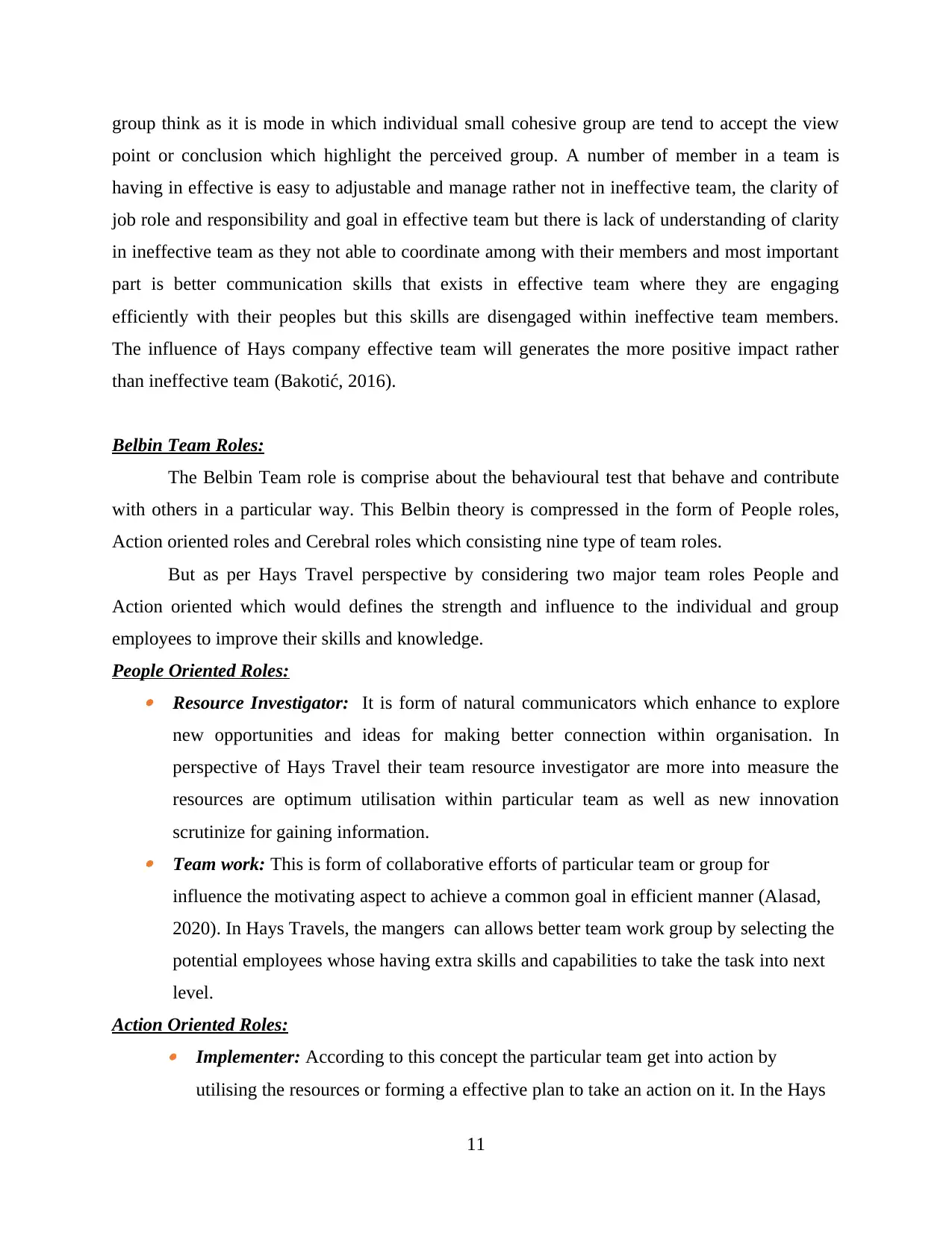
group think as it is mode in which individual small cohesive group are tend to accept the view
point or conclusion which highlight the perceived group. A number of member in a team is
having in effective is easy to adjustable and manage rather not in ineffective team, the clarity of
job role and responsibility and goal in effective team but there is lack of understanding of clarity
in ineffective team as they not able to coordinate among with their members and most important
part is better communication skills that exists in effective team where they are engaging
efficiently with their peoples but this skills are disengaged within ineffective team members.
The influence of Hays company effective team will generates the more positive impact rather
than ineffective team (Bakotić, 2016).
Belbin Team Roles:
The Belbin Team role is comprise about the behavioural test that behave and contribute
with others in a particular way. This Belbin theory is compressed in the form of People roles,
Action oriented roles and Cerebral roles which consisting nine type of team roles.
But as per Hays Travel perspective by considering two major team roles People and
Action oriented which would defines the strength and influence to the individual and group
employees to improve their skills and knowledge.
People Oriented Roles: Resource Investigator: It is form of natural communicators which enhance to explore
new opportunities and ideas for making better connection within organisation. In
perspective of Hays Travel their team resource investigator are more into measure the
resources are optimum utilisation within particular team as well as new innovation
scrutinize for gaining information. Team work: This is form of collaborative efforts of particular team or group for
influence the motivating aspect to achieve a common goal in efficient manner (Alasad,
2020). In Hays Travels, the mangers can allows better team work group by selecting the
potential employees whose having extra skills and capabilities to take the task into next
level.
Action Oriented Roles:
Implementer: According to this concept the particular team get into action by
utilising the resources or forming a effective plan to take an action on it. In the Hays
11
point or conclusion which highlight the perceived group. A number of member in a team is
having in effective is easy to adjustable and manage rather not in ineffective team, the clarity of
job role and responsibility and goal in effective team but there is lack of understanding of clarity
in ineffective team as they not able to coordinate among with their members and most important
part is better communication skills that exists in effective team where they are engaging
efficiently with their peoples but this skills are disengaged within ineffective team members.
The influence of Hays company effective team will generates the more positive impact rather
than ineffective team (Bakotić, 2016).
Belbin Team Roles:
The Belbin Team role is comprise about the behavioural test that behave and contribute
with others in a particular way. This Belbin theory is compressed in the form of People roles,
Action oriented roles and Cerebral roles which consisting nine type of team roles.
But as per Hays Travel perspective by considering two major team roles People and
Action oriented which would defines the strength and influence to the individual and group
employees to improve their skills and knowledge.
People Oriented Roles: Resource Investigator: It is form of natural communicators which enhance to explore
new opportunities and ideas for making better connection within organisation. In
perspective of Hays Travel their team resource investigator are more into measure the
resources are optimum utilisation within particular team as well as new innovation
scrutinize for gaining information. Team work: This is form of collaborative efforts of particular team or group for
influence the motivating aspect to achieve a common goal in efficient manner (Alasad,
2020). In Hays Travels, the mangers can allows better team work group by selecting the
potential employees whose having extra skills and capabilities to take the task into next
level.
Action Oriented Roles:
Implementer: According to this concept the particular team get into action by
utilising the resources or forming a effective plan to take an action on it. In the Hays
11
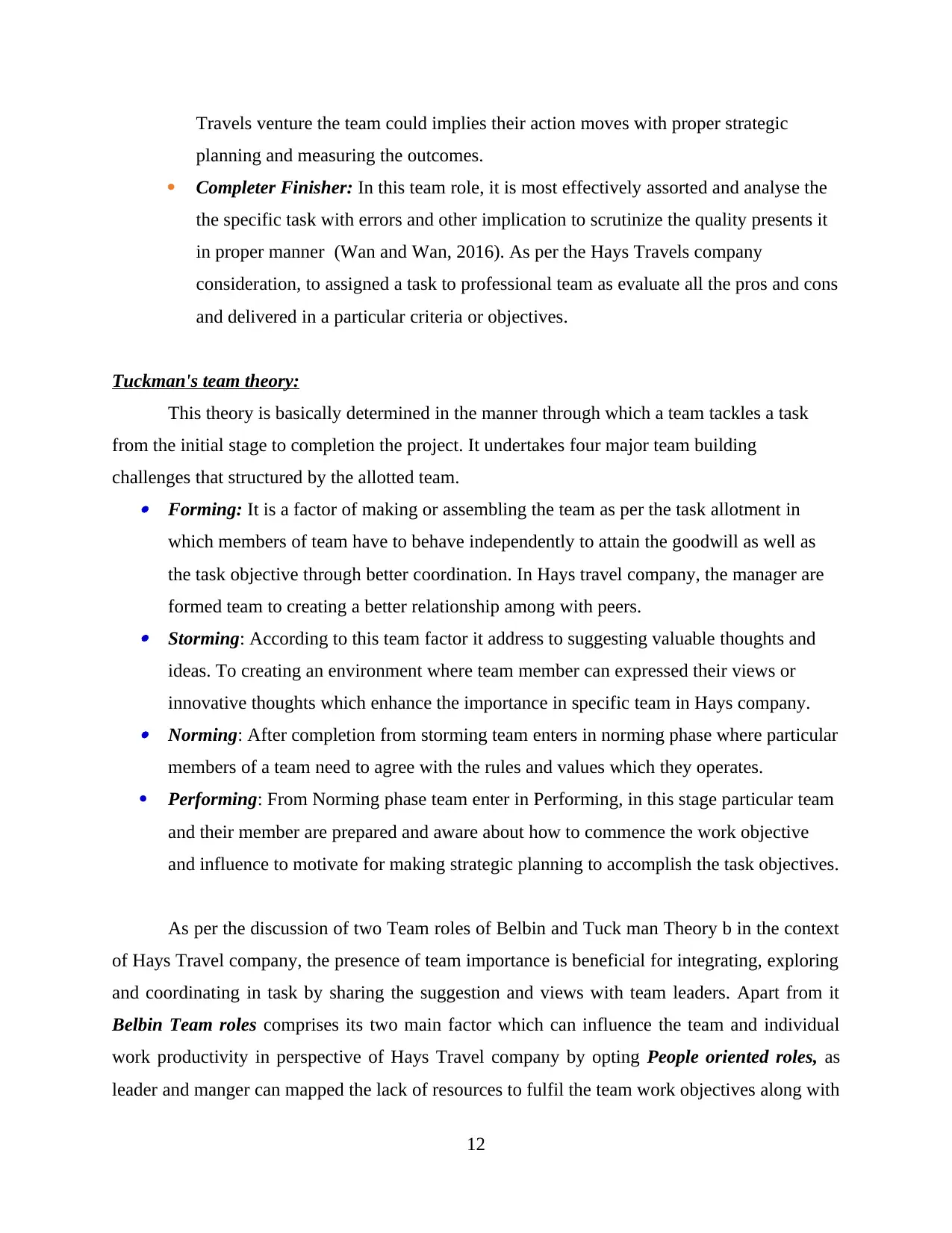
Travels venture the team could implies their action moves with proper strategic
planning and measuring the outcomes.
Completer Finisher: In this team role, it is most effectively assorted and analyse the
the specific task with errors and other implication to scrutinize the quality presents it
in proper manner (Wan and Wan, 2016). As per the Hays Travels company
consideration, to assigned a task to professional team as evaluate all the pros and cons
and delivered in a particular criteria or objectives.
Tuckman's team theory:
This theory is basically determined in the manner through which a team tackles a task
from the initial stage to completion the project. It undertakes four major team building
challenges that structured by the allotted team. Forming: It is a factor of making or assembling the team as per the task allotment in
which members of team have to behave independently to attain the goodwill as well as
the task objective through better coordination. In Hays travel company, the manager are
formed team to creating a better relationship among with peers. Storming: According to this team factor it address to suggesting valuable thoughts and
ideas. To creating an environment where team member can expressed their views or
innovative thoughts which enhance the importance in specific team in Hays company. Norming: After completion from storming team enters in norming phase where particular
members of a team need to agree with the rules and values which they operates.
Performing: From Norming phase team enter in Performing, in this stage particular team
and their member are prepared and aware about how to commence the work objective
and influence to motivate for making strategic planning to accomplish the task objectives.
As per the discussion of two Team roles of Belbin and Tuck man Theory b in the context
of Hays Travel company, the presence of team importance is beneficial for integrating, exploring
and coordinating in task by sharing the suggestion and views with team leaders. Apart from it
Belbin Team roles comprises its two main factor which can influence the team and individual
work productivity in perspective of Hays Travel company by opting People oriented roles, as
leader and manger can mapped the lack of resources to fulfil the team work objectives along with
12
planning and measuring the outcomes.
Completer Finisher: In this team role, it is most effectively assorted and analyse the
the specific task with errors and other implication to scrutinize the quality presents it
in proper manner (Wan and Wan, 2016). As per the Hays Travels company
consideration, to assigned a task to professional team as evaluate all the pros and cons
and delivered in a particular criteria or objectives.
Tuckman's team theory:
This theory is basically determined in the manner through which a team tackles a task
from the initial stage to completion the project. It undertakes four major team building
challenges that structured by the allotted team. Forming: It is a factor of making or assembling the team as per the task allotment in
which members of team have to behave independently to attain the goodwill as well as
the task objective through better coordination. In Hays travel company, the manager are
formed team to creating a better relationship among with peers. Storming: According to this team factor it address to suggesting valuable thoughts and
ideas. To creating an environment where team member can expressed their views or
innovative thoughts which enhance the importance in specific team in Hays company. Norming: After completion from storming team enters in norming phase where particular
members of a team need to agree with the rules and values which they operates.
Performing: From Norming phase team enter in Performing, in this stage particular team
and their member are prepared and aware about how to commence the work objective
and influence to motivate for making strategic planning to accomplish the task objectives.
As per the discussion of two Team roles of Belbin and Tuck man Theory b in the context
of Hays Travel company, the presence of team importance is beneficial for integrating, exploring
and coordinating in task by sharing the suggestion and views with team leaders. Apart from it
Belbin Team roles comprises its two main factor which can influence the team and individual
work productivity in perspective of Hays Travel company by opting People oriented roles, as
leader and manger can mapped the lack of resources to fulfil the team work objectives along with
12
⊘ This is a preview!⊘
Do you want full access?
Subscribe today to unlock all pages.

Trusted by 1+ million students worldwide
1 out of 15
Related Documents
Your All-in-One AI-Powered Toolkit for Academic Success.
+13062052269
info@desklib.com
Available 24*7 on WhatsApp / Email
![[object Object]](/_next/static/media/star-bottom.7253800d.svg)
Unlock your academic potential
Copyright © 2020–2026 A2Z Services. All Rights Reserved. Developed and managed by ZUCOL.




